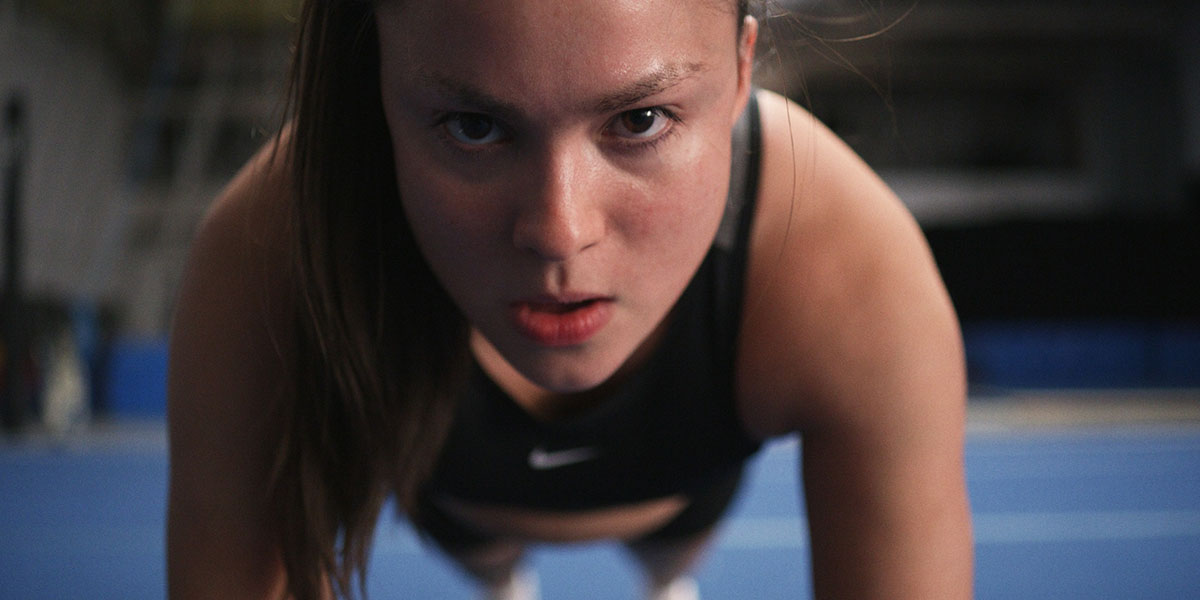You might not think cheerleading is a particularly intense sport—but you’d be wrong. Backspot, directed by D.W. Waterson and produced by Elliot Page, makes the sport feel more visceral, painful and more brutal than you’ve seen before. Tearing back the cheerful, colourful and sparkly veneer of cheer squads, Backspot offers up a searing sports drama that merges with coming-of-age and queer romance to create one of the most surprising and engaging films at this year’s Toronto International Film Festival.
Backspot stars Reservation Dogs’ Devery Jacobs (also credited as producer) as Riley, a high schooler who has no greater passion than her love of cheerleading. She’s the backspot, whose job is to protect the flyer, holding their legs, assisting their launch in the air and ensuring everything goes smoothly, so nobody gets hurt. It’s a vital position, requiring immense concentration and strength: one wrong move and the flyer can come crashing down with broken bones and crushed dreams.
Riley is on her high school cheerleading team, but dreams of joining an elite cheer squad that practises in the same gym, and performs in major competitions with international recognition. When a few members of that squad get injured, it opens a once-in-a-lifetime opportunity for Riley to join, along with her girlfriend Amanda (Kudakwashe Rutendo). The squad is run by Eileen (Evan Rachel Wood) who drives furiously toward perfection, pushing her athletes to their limits and beyond to reach the top.
Director D.W. Waterson, who is also a DJ, seamlessly transfers their mixing skills into their feature directorial debut. A DJ is required to manage the flow of energy through any event, and Backspot has an electric energy that carries throughout the entire film. There are moments of sheer intensity as when Riley fights harder than ever to perfect her craft. The slower moments, like the quiet observations of Riley’s home life, are perfectly balanced with the high-flying stakes of the cheerleading world and provide vital context that fleshes out characters you’ll grow to adore over the course of the film.
Backspot is particularly enticing for sports fans—seeing the inner workings of a sport that rarely gets its due is exciting. The constant repetition of stunts to achieve perfection (according to Eileen, they are never perfect), and full days of cheerleaders throwing their bodies around in kicks, flips and jumps practically make you break a sweat while watching.
While Backspot lives up to its promise of a gruelling sports drama, it never loses sight of the fact its central characters are teens. There’s a great deal of carefully observed detail in the depiction of Riley and Amanda’s relationship. Waterson films their scenes together with such tenderness, and moments like the two of them opening a pack of Twizzlers and making fake mustaches out of them before kissing are absolutely adorable. Later, they also discover that their coach Eileen is also a lesbian. The precise moment they leave the gym, Riley and Amanda are overcome by excitement, becoming literal giggling schoolgirls, so overjoyed that their coach is also queer. It’s beautifully authentic, capturing that unbridled excitement of knowing there are more queer people around, especially in a position of leadership—especially when you’re in high school, where your queerness is often a new discovery.
As Riley, Jacobs is remarkable. It’s a hugely physical performance, but it’s also an emotional one. Riley’s family is wealthy, but she’s disconnected from her parents. She hardly ever sees her father, and her mother is clearly struggling. Riley can’t seem to break through to her, and neither of her parents ever recognizes Riley’s accomplishments. But Eileen presents a sort of maternal figure who actually sees Riley’s talents, which causes Riley to push the boundaries of their relationship to try and get the connection she lacks at home. Jacobs gives so much life to her character, and you never doubt Riley’s incredible (and at times, incredibly frightening) desire to be the very best at her craft, regardless of the consequences, as her anxieties and compulsive behaviours threaten to take over.
As Amanda, Rutendo is lovely, a perfect foil to Riley’s intensity. Amanda cares about cheerleading, but nowhere to the extent her girlfriend does, which causes spiky tension—Rutendo handles Amanda’s frustrations excellently. Joanne Sarazen’s script wisely gives enough room to Amanda as to Riley: we learn just as much about her warm, inviting, yet working-class family as we do Riley’s stuffy, wealthy one. How the respective family dynamics reflect Riley and Amanda’s lives is fascinating.
Backspot is a winner; a gritty sports drama about pushing yourself beyond your limits and risking everything, balanced delicately and effectively with a tender queer romance.


 Why you can trust Xtra
Why you can trust Xtra


